| SHADOWS ON THE WALL | REVIEWS | NEWS | FESTIVAL | AWARDS | Q&A | ABOUT | TALKBACK | |||||
 Shadows off the beaten path Shadows off the beaten pathIndies, foreigns, docs, revivals and shorts...
On this page:
DONBASS |
MARILYN |
SUNBURN
| |||||
| See also: SHADOWS FILM FESTIVAL | Last update 26.Apr.19 | |||||
|
Donbass Review by Rich Cline |  MUST
MUST  SEE SEE
| |||||
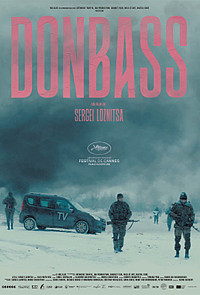 dir-scr Sergei Loznitsa prd Heino Deckert with Tamara Yatsenko, Olesya Zhurakovska, Liudmila Smorodina, Boris Kamorzin, Thorsten Merten, Alexander Zamurayev, Irina Plesnyaeva, Valeriy Antoniuk, Zhanna Lubgane, Vadim Dubovsky, Georgiy Deliev, Irina Zayarmiuk release Ukr 18.Oct.18, US 11.Jan.19, UK 26.Apr.19 18/Ukraine 2h01 CANNES FILM FEST TORONTO FILM FEST |
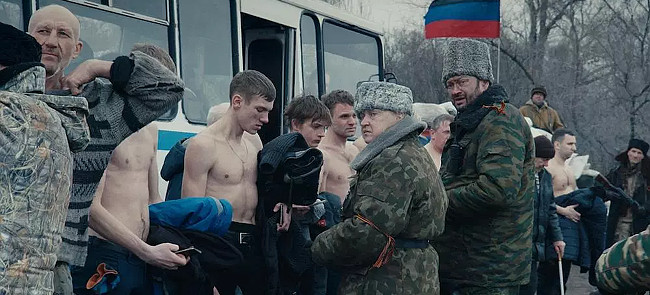 Channelling outrage in a darkly comedic style, Ukrainian writer-director Sergei Loznitsa takes on the chaotic situation in his nation's eastern region, which is currently caught up in a Russian-fuelled civil war. With its blustering politicians, spinning press officers and annoyed public, the film has a whiff of Armando Iannucci's snappy approach (see In the Loop and Veep). Although the humour here is even darker. In Russian-occupied Donbass, actors playing townsfolk, soldiers and journalists are herded into position while bombs are set off in the streets. They then appear in manufactured TV reports about fake atrocities. Later, a politician (Kamorzin) makes clearly false promises to a hospital staff. Checkpoint soldiers taunt a foreign journalist (Merten) while forcing men riding a city bus to strip to the waist to determine if they'll make good soldiers. No one wants to admit to being the commander, and when they launch fatal attacks, the Russians are quick to blur the truth about who's responsible. Shot documentary-style with skilfully inquisitive camerawork by Oleg Mutu, the film is a collection of loosely connected scenes that knowingly play on the corruption that swirls around this conflict, in which residents basically ignore the clash between local officials and the Russians who are running the breakaway "people's republic". The camera shifts between politicians lying through their teeth, soldiers abusing their power and everyday people who are weary of the pointless violence and mayhem that now surrounds them. There aren't any central characters, just a continual stream of people vividly played by a sparky cast. Standouts include Plesnyaeva as an unfeasably glamorous woman living in a cramped apartment full of refugees then working for a callous official (Dubovsky). A young businessman (Zamurayev) tries to track down his stolen car, which the army has no intention of returning. And then there's the man (Antoniuk) labeled a fascist and tied to a pole, where he's abused by passers-by, including young people who take selfies and old women who are much crueller. Many sequences are shot in a single long take. They are increasingly violent and disturbing, as people express anger and frustration at the injustice around them. One of the more outrageous scenes involves a garishly smiley wedding with a boisterous crowd of gun-toting revellers. And the story cycles back to the actors from the opening scene, with a chilling twist. With this compulsively mesmerising film, Loznitsa has tapped into his nation's beleaguered soul in a way that's immediately recognisable in the global post-truth era.
| ||||
|
Marilyn Review by Rich Cline | 
| |||||
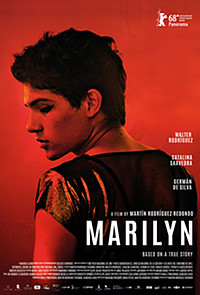 dir Martin Rodriguez Redondo scr Mariana Docampo, Mara Pescio, Martin Rodriguez Redondo prd Paula Zyngierman, Martin Rodriguez Redondo, Giancarlo Nasi with Walter Rodriguez, Catalina Saavedra, German de Silva, Ignacio Gimenez, Andrew Bargsted, Josefina Paredes, Rodolfo Garcia Werner, German Baudino, Susana Taylor, Gaston Leiva, Cristian Ru, Julia Gonzalez release Arg 11.Oct.18, US 26.Apr.19 18/Argentina 1h19 BERLIN FILM FEST |
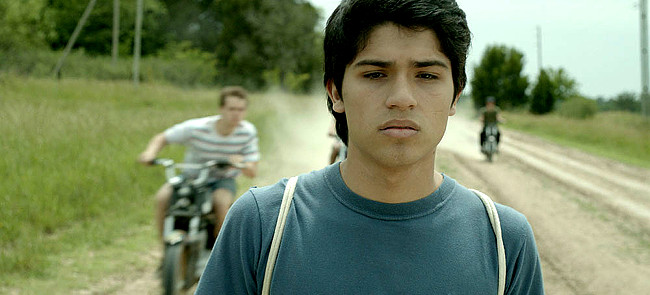 Based on a true story, this quietly observational drama makes some strong comments about the grip of machismo in Latin America. The depiction is complex and textured, as filmmaker Martin Rodriguez Redondo is so careful to understate both words and actions. Some plot strands and characters may feel undercooked, but the film is notable as a tender coming-of-age story with a heart-stopping sting in its tail. In rural Argentina, 17-year-old Marcos (Rodriguez) is put to work on his family farm for the summer, although his brother Carlitos (Gimenez) does all the heavy lifting. His father Carlos (Silva) hopes Marcos will be the first family member to attend university, while his mother Olga (Saavedra) relies on him for fashion advice. She's not the only one who notices his preference for female clothing, and he's brutalised by teens from the town, who call him Marilyn. Then a series of events push him to make some big decisions. A gentle tone draws the audience into Marcos' perspective as he reacts to people and events around him. And the way he deals with his deeper yearnings makes him darkly sympathetic, such as sewing a sexy disguise to wear at the local Carnival celebration, where he dances with abandon. He's still working out who he is and what he wants from life. And when the family finds itself in a crisis, Marcos is going to have to step up. Performances are subtle and realistic, never overplaying the more dramatic moments. This adds real emotion to moments of violence or tragedy. Rodriguez brings soft honesty to Marcos, remaining steely in intense conflicts. And Saavedra adds a powerful kick as a harshly no-nonsense woman who simply refuses to let him be himself outside the house. Of course, Marcos can't comply. Meanwhile, the other men are grappling with their masculinity, and the actors play them with bracing complexity. The narrative takes some heavy turns, with scenes that are darkly disturbing or silently tense. The plot structure is somewhat meandering, following Marcos' internal journey more than the specific sequence of events he is grappling with. The metaphor of the family's new house being identical to the neighbours is a little on-the-nose. But while some of the knee-jerk reactions feel a little simplistic, the point is clearly made that many people are simply unaware that they are cruel bigots. And for their victims, survival can cause extreme reactions.
| ||||
|
Sunburn Golpe de Sol Review by Rich Cline | 
| |||||
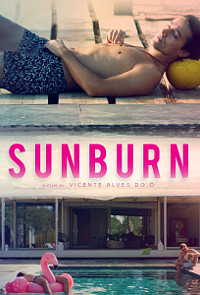 dir-scr Vicente Alves do O prd Pandora da Cunha Telles, Pablo Iraola with Ricardo Pereira, Oceana Basilio, Nuno Pardal, Ricardo Barbosa, Rafael Gomes, Carlos release US/UK 26.Apr.19 18/Portugal 1h35  |
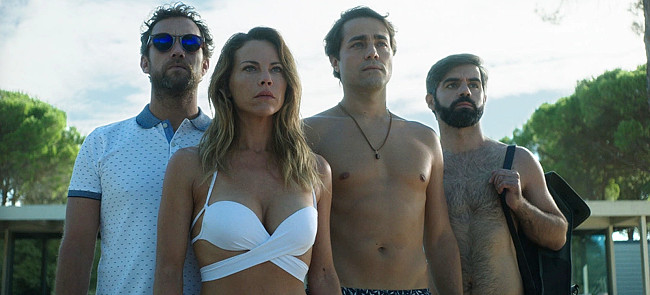 There's an intriguing fluidity to this sunny Portuguese drama in which four friends go on holiday at an isolated villa. Filmmaker Vincente Alves do O cleverly drops little touches into each scene, often using experimental styles and bold imagery as he reveals details of attitudes and connections. The story may be somewhat elusive and melodramatic, but the film is a fiercely observant look at the complex nature of human connections. As four friends relax in the sunshine, subtle tensions swirl between them. Joana (Basilio) has agreed to have a child with her boyfriend Francisco (Pardal), who owns the house. Vasco (Pereira) is seeing a married man. And Simao (Barbosa) is a screenwriter on a deadline, failing to mention that his new script is about them. Then their old friend David (Oliveira) calls to say that that he's dropping by for a visit. None of them have seen him for 10 years, and the thought of his arrival brings up dark memories for each of them. As the hours pass, thoughts gurgle under the surface while tensions rise. These four friends are clearly very close, but they would rather dance with each other than talk. Meanwhile, David's occasional voiceover vaguely hints at the issues in their past. The film is beautifully photographed in clever shots that position the characters in relation to their environment and each other. And the sterile villa offers a setting that's both realistic and metaphorical: it's in a forest as a wildfire breaks out. Because of the nature of the story, performances are tightly contained. These people don't want anyone to know how they feel, but the actors skilfully offer clues to the audience. Using full physicality, they swim, run, dance and circle around each other, having partial conversations in which they reveal but fail to deal with their repressed feelings. So even if the characters feel undefined, their yearnings are often unnervingly clear. And the various bombshells they drop are powerful. "Why do we lie so much when we love someone?" David asks. Alves' script plays with the idea that these people think they have dealt with their past issues, when actually they have merely ignored them. So David's impending return brings everything up again, complicated because each person feels a sense of ownership of his memory. Alves also takes a remarkably open approach to attraction and sexuality, refusing to draw the usual lines or paint his characters into boxes. This gives the film a blast of authenticity that, even if it's just out of reach, is deeply moving.
| ||||

See also: SHADOWS FILM FESTIVAL © 2019 by Rich Cline, Shadows
on the Wall
HOME | REVIEWS | NEWS | FESTIVAL | AWARDS
| Q&A | ABOUT | TALKBACK | | ||||
